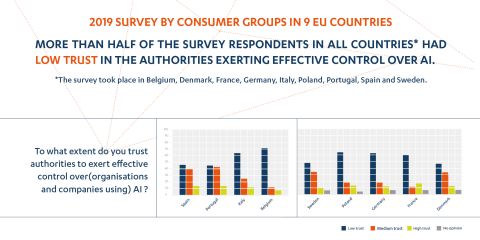EU member states mostly fail to improve consumer protection against risks of harmful AI
About this publication
Ministers have reached a disappointing position for consumers on the AI Act, a vital piece of legislation to regulate AI and meant to protect consumers from harm the technology could cause.
National governments have left too many important issues unaddressed, such as facial recognition by private companies in publicly accessible places, and have watered down important provisions regarding which systems would classify as high risk.
Consumers are at risk of not having enough of the rights they need when they are subject to automated decisions or when they interact with AI although, among the improvements, member states have at least proposed to ban social scoring by private entities.
Ursula Pachl, Deputy Director General of the European Consumer Organisation (BEUC), said:
“EU Member States are letting consumers down with their position. Consumers are worried about the risks of AI, such as its potential to increase discrimination, and have low trust in authorities exerting effective control over AI. Yet national governments failed to improve protection from harmful AI systems, such as facial recognition by private companies in publicly accessible places. They have also ignored calls to grant consumers basic rights when they are subject to automated decisions or interact with an AI system.
“All this reinforces how crucial it is the Parliament stands up for consumers when they adopt their position on the AI Act in the new year. If not, this legislation could end up being a disillusion, given that artificial intelligence is going to radically change our markets and societies and consumers must have the right protections.”
Background
For BEUC, the Commission’s proposal largely missed the mark given the risks about how AI might be used. A survey we carried out in 2020 found respondents were generally concerned about the technology’s risks, while more than half doubted that authorities would be able to exert control over AI.
ENDS
For more information on BEUC’s position on the AI Act, you can consult our factsheet and a consumer checklist which summarise our main concerns.
Download:


